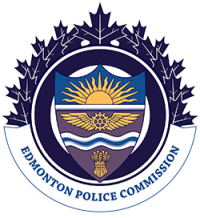The Edmonton Police Commission (Commission) is committed to the fundamental principles of accountability and transparency. These principles are essential to ensuring effective governance and building public trust. To that end, and where appropriate, necessary, and advisable, the Commission will provide accurate, credible and timely information to the media and other stakeholders.
Guidelines:
- Commissioners will fully uphold the Code of Conduct for members, specifically the sections that pertain to communications and media relations:
- Section 2: At all times conduct themselves in a manner that is respectful and courteous of other Commissioners, Commission staff, members of the Edmonton Police Service, and the public.
- Section 9: Not speak to the media on behalf of the Commission unless delegated to do so by the Commission Chairperson. The Chair will be the spokesperson for
the Commission. Delegation of this authority may be made from time to time to designated members of the Commission.-
- If speaking to the media in their individual capacity, individual Commissioners must notify the media that they are not speaking as a spokesperson for the Commission.
- A Commissioner who expresses disagreement with a decision of the Commission shall make it clear that the member is expressing a personal opinion, and not the opinion of the Commission.
- Section 10: Keep confidential any information discussed at an in-camera or closed meeting.
- Section 15: Avoid real or perceived conflicts of interest.
-
- The release of information by the Commission will comply with the Freedom of Information and Protection of Privacy Act and associated regulations.
- The Commission shall deal fairly and honestly with journalists, and uphold high standards of accuracy, integrity and truth.
- The Commission shall ask journalists to correct false or misleading information.
- The Chair of the Commission shall be considered the Commission’s spokesperson for all journalist inquiries. When the Chair is unavailable, the Vice Chair will be considered the spokesperson.
- In special circumstances, the Commission may designate another Commission member to act as spokesperson.
- When a journalist inquiry is made with respect to information on decisions made by the Commission, the Executive Director may act as spokesperson.
- The Communications Advisor will serve as liaison between journalists and the Commission when requests are received for interviews or comments.
- The Communications Advisor will provide the Commission assistance and advice in areas related to communications planning, stakeholder relations, media relations, issues management, public engagement and digital media (website and social media).
- The Communications Advisor will manage the effective and appropriate use of the Commission’s brand and visual identity.
- The Commission will establish a yearly communications plan for furthering stakeholder and public relations.
- All inquiries regarding the activities of the Edmonton Police Service, particularly those of a sensitive nature, will be handled by the Service as per EPS policy – Media and Police Relations IS7PO.
Procedures:
- Administration will send all media releases to the Chair in advance of their release.
- Administration will distribute Commission position statements and key messages developed for specific topics and issues to all Commission members.
- Commissioners will direct all media requests to Administration for response.
References:
- Appendix C – Edmonton Police Commission Code of Conduct
- EPC Policy 4.1.2 – Roles and Duties of the Chair of the Commission
- Freedom of Information and Protection of Privacy Act, RSA 2000, c F-25
